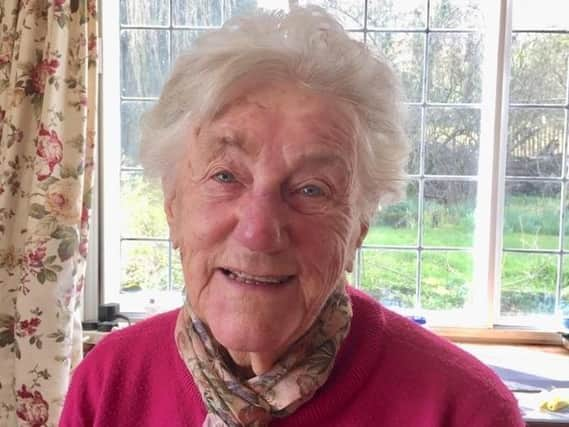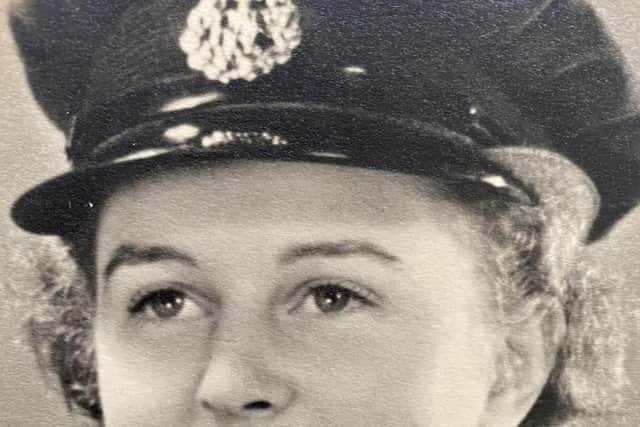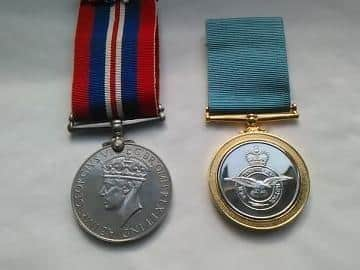Banbury area woman, one of the last surviving members of the Second World War armed forces, has died aged 96


Mrs Chadwick recounted her VE Day experiences in a feature in the Banbury Guardian last year - see here.
Mrs Chadwick - then Joanna Robins, daughter of the best-selling romantic novelist Denise Robins - joined the Women's Auxiliary Air Force (WAAF) in 1942 on the day she left Downe House school. She was not called up until her 18th birthday on August 12.
Advertisement
Hide AdAdvertisement
Hide AdHer elder sister, Pat, had joined up at the outbreak of war in 1939, becoming one of the 'Beauty Chorus' of RAF officers engaged in the top secret, innovative radar system that allowed British fighters to outfox and intercept German bombers and help win the Battle of Britain. Mrs Chadwick's elder sister, Eve, had joined the Auxiliary Territorial Service (ATS), the women's branch of the British Army, where she was also an officer.


Miss Robins, Leading Aircraftswoman (LACW) Robins 2130156, was attached to the RAF Met Office, plotting weather to aid Britain's aerial fighters and bombers. She did her initial training in Innsworth in Gloucestershire and during her service years was posted to Portreath in Cornwall, Preston, Lancashire, Defford (near Pershore) and finally to Fighter Command at Stanmore.
"I joined on the premise that I would request to go on camp with Pat but there was no question and it didn't happen until the last year of the war when I was posted to RAF Stanmore with her. I had to salute her whenever I saw her and call her Ma'am," she told the Banbury Guardian last year.
"I could not be an officer because in the Met Office, you had to have a science degree and at that time I had not been to university," she said. "They tried very hard to get me to leave the Met Office and go into admin so I could be an officer but I didn't want to leave my job.
Advertisement
Hide AdAdvertisement
Hide Ad"On the hour, we would go out to do observation - observe the way of the wind, rain and cloud where you were. You measured the rain and direction of wind and in a good camp you had a measure to tell you position of the wind and how strong it was. The information was sent by teleprinter and plotted immediately onto the 'new hours' printouts of the British Isles which showed up as a mass of tiny circles all over the country with a number. You had a code which told you where the number was, for example Durham or Derby.


"The exciting thing was on the night shift when you would get the weather reports from occupied France - sometimes via a spy in Germany - and you could plot weather for bombers and other aircraft which was vital for them."
Mrs Chadwick and her sister joined thousands of others in central London for Victory in Europe (VE) Day, May 8, 1945. The two were not de-mobbed until Victory in Japan (VJ) day in August.
"I can't describe the feelings we had. It was hugely emotional," she said. "The war was over and all the effort we had put in was over. Everyone was singing the Vera Lynn songs we loved so much - We'll Meet Again and others.
Advertisement
Hide AdAdvertisement
Hide Ad"We had stopped fighting in Europe. We had won the battle over Germany - they had surrendered and it was a huge relief for people, particularly those with sons in the forces in Europe who could now look forward to them finally coming home. For us girls it was over but not for the young men in the Far East as we had the war against Japan to see through."
After the war, Mrs Chadwick continued her childhood passion for music, gaining her licentiate in music, specialising in clarinet and piano, at Trinity College of Music, London. She was also a member of the Bach Choir. When her children were more independent she became a well-known clarinet teacher at Banburyshire schools, retiring finally aged 80.
During her 54 year marriage to artist and sculptor Roland Chadwick, who died in 2002, Mrs Chadwick had seven children. She was a keen smallholder at their homes in Hertfordshire and Essex and farmed a 36-acre holding in north Wales, keeping cows, sheep, pigs and poultry for the table.
She had many passionate interests during her life, importing the first two Rottweilers from Germany post-war and training them in obedience. The dogs gained a number of accolades at Crufts. Mrs Chadwick also became experienced in breeding budgerigars and Arabian horses. She took up classical guitar in the 1960s.
Advertisement
Hide AdAdvertisement
Hide AdThe couple moved to Hook Norton in 1976 where Mrs Chadwick soon became a member of Banbury Symphony Orchestra becoming principal clarinet. She also took up video recording and her family keeps her film library of Hook Norton life through the seasons.
Mrs Chadwick's funeral takes place next Monday at 1pm at St Peter's Church, Hook Norton with Covid restrictions in place. Her coffin will be taken from her home in Scotland End to the church on the Hook Norton Brewery show dray.
She leaves her seven children, David, Pauline, Roseanne, Ben, Ginny, Wendy and Lawrence, 16 grandchildren, six great-grandchildren and a great, great grandson. Donations in lieu of flowers will be divided between the Hook Norton Fire Service and Hooky Neighbours. For details contact Edd Frost & Daughters - details here.